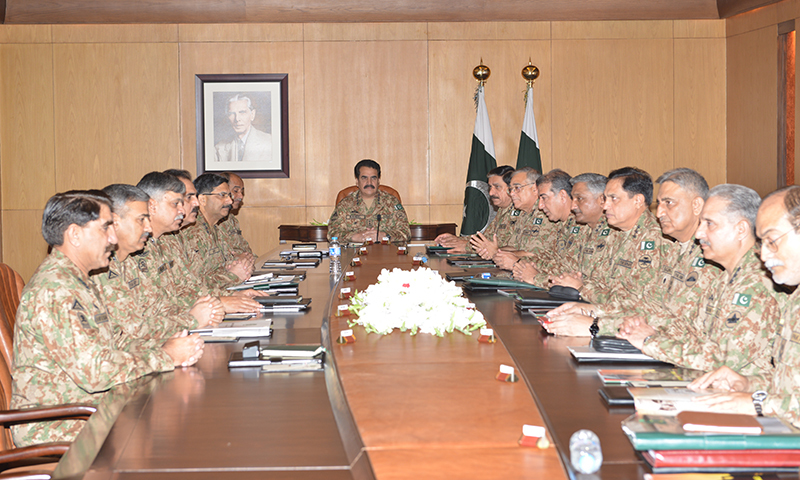RAWALPINDI: Chief of Army Staff (COAS) General Raheel Sharif on Wednesday chaired a meeting of the corps commanders at the General Headquarters (GHQ) Rawalpindi to review the security pact signed between the newly elected Afghan administration and the United States and termed it "a good move for durable peace in Afghanistan".
Yesterday, Afghan officials and the US had signed a long-delayed security agreement to allow American troops to stay in Afghanistan after the end of the year, filling a campaign promise by new President Ashraf Ghani.
Under the terms of agreement, 12,000 foreign military personnel would be expected to stay after 2014, when the combat mission of Afghanistan's US led Nato force ends.
The Taliban, on the other hand, had denounced the pact with the United States calling it a “sinister” plot by the Americans to control Afghanistan and restore its international credibility as a military super power.
“Under the name of the security agreement, today Americans want to prepare themselves for another non-obvious and very dangerous fight,” the Taliban had said in a statement emailed to media.
Afghanistan often blames Pakistan for supporting insurgents who are fighting both Nato troops and government forces. Afghan officials also claim Pakistan has had a role in major attacks and suicide bombings.
Relations between the two countries have been hot and cold in recent years.
Know more: Afghanistan, US sign long-awaited security pact
Sources told Dawn that the meeting reviewed internal and external security threats to the country and expressed resolve to meet these challenges.
The corps commanders also discussed the ongoing military operation Zarb-i-Azb and expressed their satisfaction over its progress.
Military operation Zarb-i-Azb was launched by the Pakistan Army on June 15 following a brazen militant attack on Karachi's international airport and failure of peace talks between the government and Tehreek-i-Taliban Pakistan (TTP) negotiators.
Know more: Operation Zarb-i-Azb
The Taliban and their ethnic Uzbek allies both claimed responsibility for the attack on Karachi airport, which was seen as a strategic turning point in how Pakistan tackles the insurgency.
Nearly a million people have fled the offensive in North Waziristan, which is aimed at wiping out longstanding militant strongholds in the area, which borders Afghanistan.
More than 1,000 militants and 86 soldiers have been killed in the assault so far, according to the military.
The area is off-limits to journalists, making it impossible to verify the numbers.












































